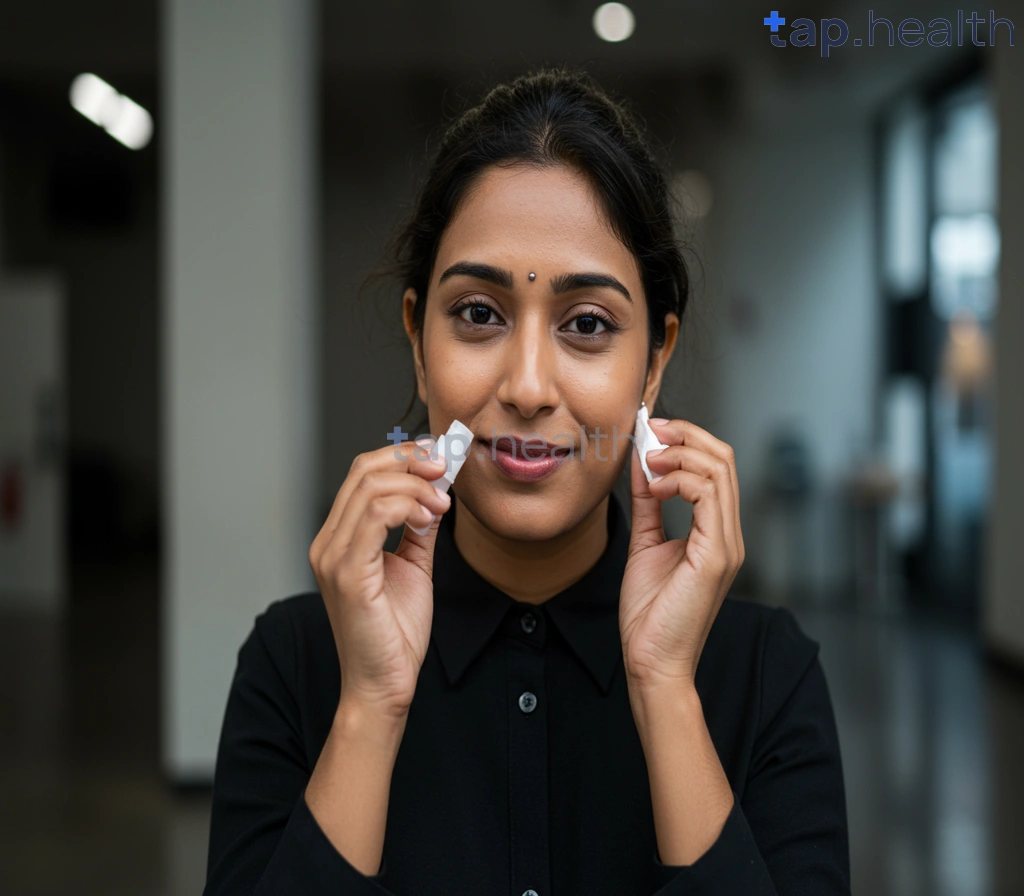Table of Contents
- Diabetes & Piercings: A Guide to Safe Body Modification
- Can Diabetics Get Piercings? Infection Risks & Prevention
- Minimizing Infection: Diabetes and Piercing Aftercare Tips
- Diabetes and Body Piercings: Is It Safe? What You Need to Know
- Safe Piercing Practices for People With Diabetes: Expert Advice
- Frequently Asked Questions
- References
Thinking about getting a new piercing but have diabetes? It’s a common question, and a valid concern! Managing diabetes and piercings requires extra care to minimize infection risk and potential complications. This blog post will delve into the important considerations for individuals with diabetes who are interested in body piercings, providing practical advice and helpful tips to ensure a safe and successful experience. We’ll explore how diabetes affects wound healing and what steps you can take to protect yourself. Let’s get started!
Diabetes & Piercings: A Guide to Safe Body Modification
Getting a piercing is a popular form of self-expression, but for individuals with diabetes, it requires extra caution. Given that 61% of people with diabetes are aged between 20-64, a demographic highly likely to consider body modification, understanding the risks is crucial. This is especially important in hot and humid Indian and tropical countries where infections can spread more rapidly.
Understanding the Increased Risk
People with diabetes have a weakened immune system, making them more susceptible to infections. Even a minor wound, like a piercing, can lead to serious complications. Poor blood sugar control further elevates this risk, as it impedes the body’s ability to heal effectively. Slow wound healing in diabetic individuals means infections can take hold more easily and potentially spread more aggressively in warmer climates. This is particularly relevant in regions like India and other tropical countries.
Minimizing Infection Risk
Choosing a reputable and hygienic piercing studio is paramount. Ensure the studio adheres to strict sterilization protocols and uses single-use needles. Aftercare is equally vital; maintaining meticulous cleanliness of the piercing site is essential. This involves regular cleaning with mild antiseptic solutions, as recommended by your piercer and doctor. Avoid touching the piercing unnecessarily. Furthermore, managing blood sugar levels is crucial for optimal healing. Consulting your doctor or diabetes educator before getting a piercing is highly recommended, especially given the increased risk of complications prevalent in tropical climates. Similar considerations apply to other forms of body modification, such as tattoos. For more information on the risks associated with tattoos and diabetes, consider reading our article on Should a Diabetic Get a Tattoo?.
Seeking Professional Advice
In India and other tropical countries, access to quality healthcare can vary. Therefore, choosing a reputable piercer and proactively managing your diabetes are key to minimizing the risk. Regular check-ups with your doctor will enable early detection and treatment of any infection. Remember, a well-managed diabetes condition significantly lowers the risks associated with piercings. Maintaining a healthy weight is also important for overall health and wound healing. For tips on safely gaining weight with diabetes, see our guide on How to Gain Weight with Diabetes Safely and Effectively – Tap Health.
Can Diabetics Get Piercings? Infection Risks & Prevention
Understanding the Risks
Diabetes significantly impacts the body’s ability to heal wounds, making infections a serious concern. This is particularly relevant in tropical and Indian climates, where warm, humid conditions can foster bacterial growth. Nearly 15% of diabetics experience foot ulcers in their lifetime, some requiring amputation, highlighting the vulnerability to infection. Getting a piercing, especially in areas with poor circulation like the feet, increases this risk. Even seemingly minor piercings can lead to serious complications for people with diabetes. Therefore, careful consideration and precautions are crucial.
Minimizing Infection Risks
Choosing a reputable and hygienic piercing studio is paramount. Ensure the studio uses sterilized equipment and follows strict infection control protocols. Opt for piercings in areas with good blood circulation, avoiding feet and areas prone to sweating. Proper aftercare is also vital. This includes gentle cleaning with saline solution, avoiding touching the piercing unnecessarily, and keeping the area clean and dry, especially important in humid climates. Ignoring aftercare instructions can lead to delayed healing and increased infection risk. Since infections can be a serious complication, understanding how diabetes interacts with other health concerns is important. For instance, you might wonder, Can Diabetics Take Antibiotics? This is a crucial question to discuss with your doctor before getting a piercing.
Regional Considerations for Diabetics in India and Tropical Countries
In India and other tropical regions, the prevalence of certain bacteria and fungi can elevate the risk of infection. The hot and humid weather can further complicate healing. Therefore, diabetics in these regions should exercise extra caution and be particularly diligent with aftercare. Consulting with a doctor before getting any piercing is strongly recommended. They can assess your individual risk factors and offer personalized advice on minimizing potential complications. Careful consideration and a proactive approach to hygiene are key to ensuring a safe piercing experience. It’s also important to understand the nature of diabetes itself. For example, you may want to know more about the transmission of the disease: Is Diabetes Contagious Sexually? This understanding can help you make informed decisions about your health.
Minimizing Infection: Diabetes and Piercing Aftercare Tips
Understanding the Risks
People with diabetes, especially those in hot and humid climates common to Indian and tropical countries, are more susceptible to infections. This is because high blood sugar levels can impair immune function, slowing wound healing and increasing the risk of complications. The added challenge of heat and humidity further elevates infection risk, creating a breeding ground for bacteria. Consider this: smokers with diabetes face a doubled mortality rate due to cardiovascular issues, highlighting the importance of managing health risks. Proper piercing aftercare is crucial for preventing serious infections in this population.
Essential Aftercare Steps
Maintaining impeccable hygiene is paramount. Wash your hands thoroughly before touching the piercing. Use a gentle, saline solution (salt dissolved in warm water) to clean the piercing twice daily. Avoid harsh soaps, lotions, and perfumes, as these can irritate the skin and impede healing. Always gently pat the area dry with a clean towel; don’t rub. In the humid conditions of many tropical regions, ensure the area gets adequate air circulation to reduce moisture build-up. This is especially important in areas like the ears where trapped moisture can lead to infection.
Recognizing Infection Signs
Early detection is critical. Watch for signs of infection, such as increased pain, redness, swelling, pus, or fever. If you notice any of these symptoms, consult a doctor immediately. Delayed treatment can lead to serious complications, including cellulitis and sepsis. Prompt medical attention is essential, especially for individuals with diabetes. Managing your diabetes effectively is also key to minimizing complications, and you can learn more about that in our article on How to Prevent Long-Term Complications of Diabetes: Easy Tips.
Seeking Professional Guidance
Before getting a piercing, consult your doctor or a healthcare professional, especially if you have diabetes or live in a tropical climate. They can advise you on the risks and provide personalized aftercare instructions. Remember, proactive care and timely intervention can make all the difference in preventing infection and ensuring your overall health and well-being. If you are planning to travel to a tropical climate, be sure to check out our guide on Traveling with Diabetes: Essential Tips for a Safe & Healthy Journey for additional advice on managing your condition while exploring new places.
Diabetes and Body Piercings: Is It Safe? What You Need to Know
Diabetes, particularly prevalent in India and other tropical countries, significantly impacts the body’s ability to heal. This heightened vulnerability makes the decision to get a piercing a complex one. Women with diabetes, for instance, already face a 40% higher risk of heart disease compared to men with diabetes, highlighting the importance of proactive health management. Therefore, understanding the potential risks associated with body piercings is crucial.
Increased Infection Risk
People with diabetes are more susceptible to infections due to impaired immune function and slower wound healing. A piercing, even a seemingly minor one, introduces a potential entry point for bacteria. In hot and humid climates common in India and tropical regions, the risk of infection further increases due to higher ambient temperatures and humidity fostering bacterial growth. Proper aftercare is paramount, and any signs of infection, such as redness, swelling, or pus, should be addressed immediately by a medical professional.
Managing the Risks
Choosing a reputable and hygienic piercing studio is the first step. Ensure the piercer uses sterile equipment and follows proper sterilization protocols. Selecting a piercing location with good air circulation is also important, especially in warmer climates. Aftercare involves diligently following the piercer’s instructions, which usually include cleaning the piercing regularly with a saline solution. Avoid touching the piercing unnecessarily and keep the area clean and dry.
Making Informed Decisions
Before getting a piercing, consult your doctor, especially if you have diabetes. They can assess your individual risk factors and provide personalized advice. In India and other tropical countries with high diabetes prevalence, proactive healthcare is key to minimizing complications. Prioritizing your health and seeking professional guidance will allow you to make an informed decision about body piercings while mitigating potential health risks. Understanding how diabetes affects your overall health is crucial, and for further information, you might find the article Can a Diabetic Person Donate Blood: Guidelines & Facts helpful. The article addresses some common misconceptions surrounding diabetes, much like the myths surrounding transmission discussed in Can Diabetes Be Transmitted Sexually? Myths vs. Facts Explained – Tap Health.
Safe Piercing Practices for People With Diabetes: Expert Advice
For people living with diabetes, body piercings come with added risks. Diabetes can slow wound healing and increase the chance of infection—a serious concern when needles and skin punctures are involved. In fact, the global burden of diabetes is staggering, with 6.7 million deaths reported in 2021. In hot and humid climates, such as those in India and tropical countries, the risk is even greater because warm conditions promote bacterial growth.
Minimizing Infection Risk
If you’re considering a piercing, safety and hygiene must be your top priorities:
-
Choose a reputable studio: Make sure the studio follows strict infection control measures—using single-use needles, sterilized equipment, and disposable gloves.
-
Follow proper aftercare: Clean the area gently with mild soap and water, avoid unnecessary touching, and keep the piercing dry.
-
Avoid harsh products: Don’t use alcohol, hydrogen peroxide, or home remedies that can irritate the skin.
-
Monitor closely: Watch for signs of infection like redness, swelling, warmth, or pus. If these occur, seek medical help immediately.
Choosing the Right Piercing
Some piercings pose more risk than others, especially for those with diabetes:
-
Avoid areas with poor blood flow like feet and ankles, as they heal slowly and are more prone to infection.
-
Start simple: Opt for less complex piercings and avoid getting multiple piercings at once.
-
Manage your diabetes well: Good blood sugar control significantly reduces infection risk and speeds up healing.
Seeking Expert Guidance
Before committing to a piercing, consult your doctor or diabetes specialist. They can assess your health status and help determine whether it’s safe for you. In India and tropical regions, where access to quality healthcare may vary, these precautions become even more critical.
A safe piercing experience depends on responsible choices and proactive health management. Remember, even small lifestyle factors—such as safe alcohol consumption—play a role in your overall health.
Frequently Asked Questions on Diabetes and Piercings
Q1. Is it safe for people with diabetes to get piercings?
While it’s not impossible, people with diabetes face a higher risk of infection from piercings due to slower wound healing and weakened immune systems. It’s crucial to take extra precautions.
Q2. What steps can I take to minimize the risk of infection if I have diabetes and want a piercing?
Choose a reputable piercing studio that maintains strict sterilization practices. Follow meticulous aftercare instructions, including regular cleaning with antiseptic solutions and avoiding touching the piercing. Manage your blood sugar levels, maintain a healthy weight, and consult your doctor before getting a piercing.
Q3. What are the signs of infection I should watch out for after getting a piercing, especially if I have diabetes?
Look for redness, swelling, or pus around the piercing site. If you notice any of these signs, seek immediate medical attention.
Q4. Are there certain piercings I should avoid if I have diabetes?
Yes, it’s best to avoid piercings in areas with poor circulation, such as the feet. Choose piercings in well-circulated areas.
Q5. How does having diabetes affect the healing process of a piercing?
Diabetes can slow down wound healing and weaken the immune system, making individuals more susceptible to infections. Maintaining good blood sugar control can help improve healing and reduce infection risk.
References
- A Practical Guide to Integrated Type 2 Diabetes Care: https://www.hse.ie/eng/services/list/2/primarycare/east-coast-diabetes-service/management-of-type-2-diabetes/diabetes-and-pregnancy/icgp-guide-to-integrated-type-2.pdf
- What is Diabetes: https://www.medschool.lsuhsc.edu/genetics/docs/DIABETES.pdf
Meta Data
Meta Title: Diabetes & Piercings: Infection Risks | Expert Guide
Meta Description: Learn about the risks of piercings with diabetes. Discover expert advice on minimizing infection and complications. Get valuable tips for safe piercing practices and maintain healthy blood sugar levels. Read now!
alt_text: Diabetic person getting a piercing, clean and safe
url_slug: diabetes-piercings-infection



